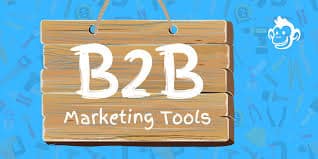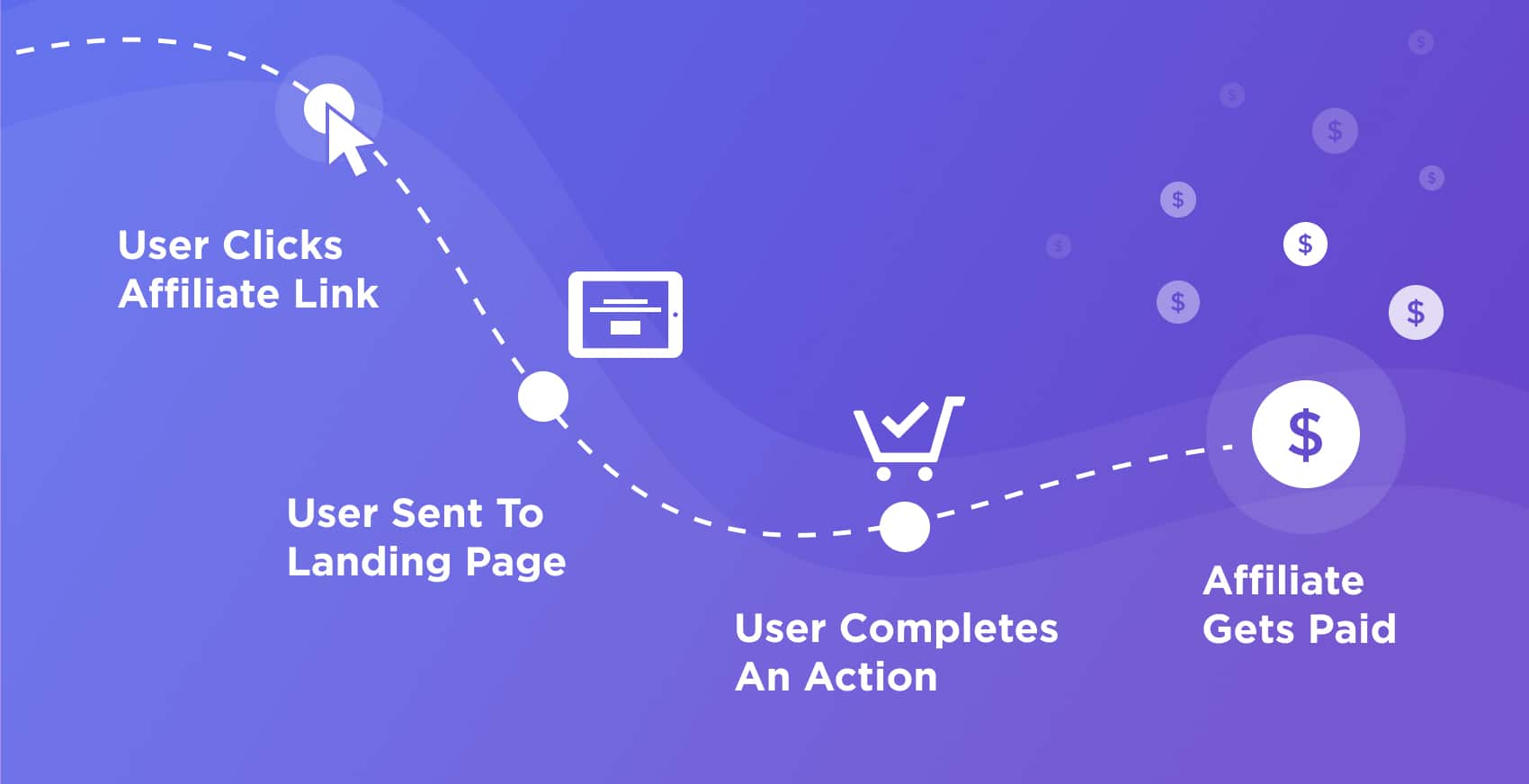I was spending a usual evening on Instagram after a long day at work when an ad for the luxury clothes I discussed with a colleague at work earlier appeared on my screen. Social media sites like Facebook and TikTok have used our data to target us for a while now. However, you may not be aware that someone was most likely in charge of using this data to run targeted advertising campaigns to persuade me to buy those clothes. The technical role for this person is known as a Media Buyer. This article is a complete and comprehensive guide to the position of social media buyers, including salary guidelines and how you can become one.
Key Points
- Media Buyers are responsible for getting their brand’s ad creative in front of the right target audience on social media platforms like Facebook, TikTok, and Google ads.
- Media Buyers work closely with the marketing ecosystem to accelerate business growth through social campaigns.
- In the United States, a media buyer’s annual salary is estimated at $87,252, with an average salary of $79,261.
- Becoming a Media Buyer without experience is challenging, but it is possible with the right mindset. Begin by learning fundamental marketing principles and advertising platforms.
Who Is a Media Buyer?
A media buyer is a marketing professional who purchases advertisements. They collaborate with professionals like magazine directors and social media coordinators. A media buyer can procure advertisements like print pages in a newspaper or magazine, audio advertisements in podcasts or radio shows, and online spaces like blogs and other websites.
They determine which advertisements are best based on the goals of the campaign. For example, a media buyer may choose advertising spots based on impressions, clicks, and conversion goals.
Since we have a grip on a media buyer, what then is media buying?
It is purchasing ad space and time on digital and offline platforms like websites, YouTube, radio, and TV. In addition, a media buyer oversees budgets, negotiates with publishers for ad inventory, and optimizes advertising to boost campaign effectiveness.
Media buyers place brands before their target audience, whether browsing a website or watching TV.
It differs from social media in that others cannot discover you there. An outward approach works best when you have a well-planned strategy. According to Rex Gelb, director of advertising and analytics at HubSpot, one of the organizations’ biggest mistakes is not carefully considering their marketing goals.
What Do Media Buyers Do?
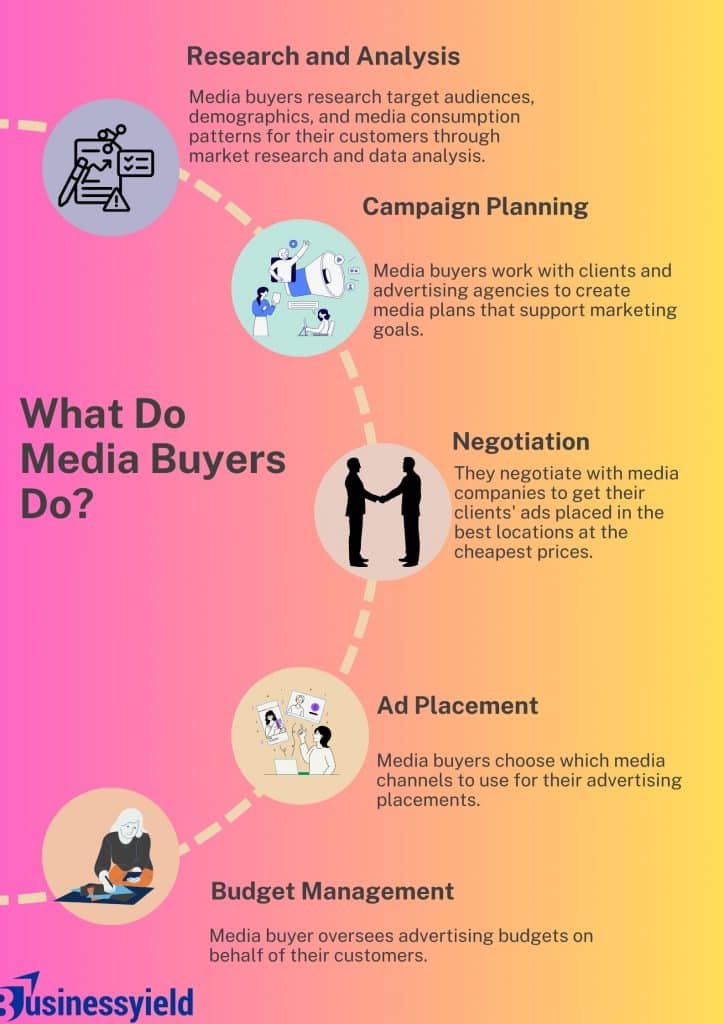
The primary goal of a media buyer is to ensure that their clients’ advertisements reach the target audience effectively and efficiently. Here are some key responsibilities of media buyers:
#1. Research and Analysis
Media buyers conduct market research and data analysis to determine their customers’ target audiences, demographics, and media consumption patterns. They then use this information to determine which media outlets are best for advertising efforts.
#2. Campaign Planning
Media buyers work with clients and advertising agencies to create media plans that support marketing goals. They choose the best time, frequency, and length to run ads for the most exposure and impact.
#3. Negotiation
They negotiate with media companies to get their clients’ ads placed in the best locations at the cheapest prices. Negotiation is necessary to achieve desirable conditions, such as lowered prices, premium placement, or enhanced value services.
#4. Ad Placement
Media buyers choose which media channels to use for their advertising placements. This involves deciding when to air TV and radio commercials, where to put print advertisements in periodicals and newspapers, and where to put digital advertisements on websites and social media.
#5. Budget Management
Media buyer oversees advertising budgets on behalf of their customers. They also distribute cash among various media outlets based on the campaign goals, the intended audience, and the anticipated return on investment (ROI).
How Is Media Planning Different From Media Buying?

There are a few differences to note between these two aspects of marketing.
Media planning involves researching media and using your business’s marketing goals, budget, target audience information, and key campaign messages to create a media plan for a specific marketing initiative or campaign. Your media plan will determine your campaign’s media mix and identify key channels for paid media, owned media, and earned media tactics.
Once your media plan is ready, your media planner will hand it off to your company’s media buyer, who is responsible for executing key elements of the paid media portion of the plan. Media buying focuses on selecting and vetting media outlets and purchasing ad space. A media buyer’s job also includes negotiating with vendors, managing campaign deadlines, trafficking ad placements to vendors, and monitoring campaign performance.
Some companies employ separate media planning and buying teams to plan campaigns. Small businesses delegate both tasks to the same marketing or media team member.
Media Buyer Salary
In the United States, a media buyer’s annual salary is estimated at $87,252, with an average salary of $79,261. These numbers represent the median, the midpoint of the ranges from our proprietary Total Pay Estimate model, and are based on wages collected from our users. The projected yearly increase in earnings is $7,991. Additional pay could include cash bonuses, commissions, tips, and profit sharing. Values that fall between the 25th and 75th percentiles of all pay data available for this role are represented by the “Most Likely Range.”
Requirements for Being a Media Buyer
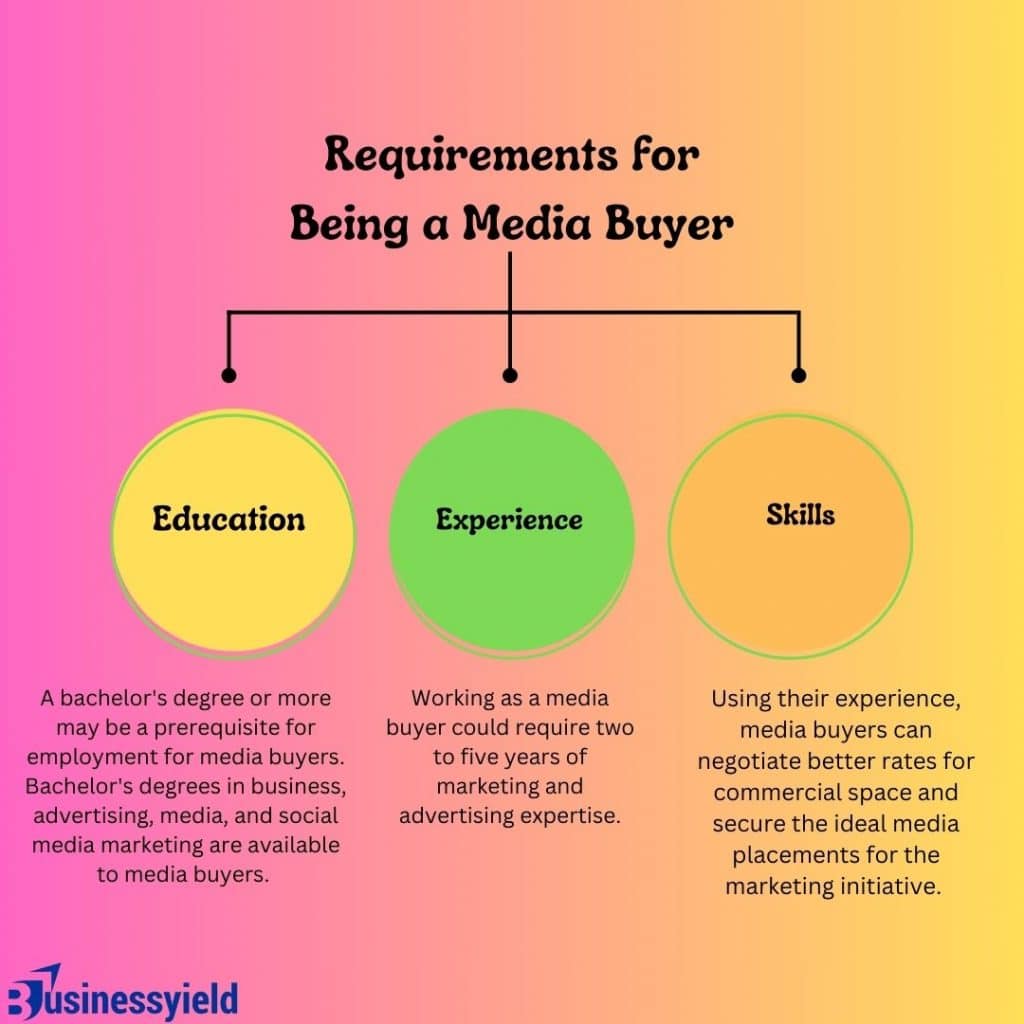
If you ask yourself, “Do you need a degree to get hired as a media buyer?” the short answer is No! Unlike other jobs where you may need a bachelor’s degree to earn six figures in marketing, a media buyer is often considered a performance-based role similar to a sales position, meaning that qualifications to be a media buyer can be looser.
Suppose you want to be hired by a larger brand or agency. In that case, consider traditional education that can help you get past the first round of screening while giving you complementary skills to become a successful media buyer.
Here are some requirements for becoming a media buyer:
#1. Education
A bachelor’s degree or more may be a prerequisite for employment for media buyers. Bachelor’s degrees in business, advertising, media, and social media marketing are available to media buyers. Marketing campaign workers for larger companies may pursue advanced degrees to improve their knowledge and abilities. For instance, as a media buyer for a significant marketing campaign, you might obtain a master’s degree in business or marketing.
#2. Experience
Working as a media buyer could require two to five years of marketing and advertising expertise. This kind of experience can be obtained through undergraduate internships or entry-level jobs in advertising or marketing. Jobs like advertising assistant and marketing associate may fall under this category. The experience level required to work as a media buyer varies based on the campaign’s size.
#3. Skills
Using their experience, media buyers can negotiate better rates for commercial space and secure the ideal media placements for the marketing initiative. Here are some essential skills that media buyers can employ:
- Critical thinking evaluates a situation, recognizes issues, and suggests workable solutions. A media buyer could apply this skill to identify advertising solutions and resolve problems at work.
- Collaboration: A media buyer may interact with managers, advertising designers, and other marketing experts. Strong communication skills help these experts communicate information more effectively and foster better teamwork and productivity.
- Technical ability: Media buyers can use computers to communicate with vendors for advertising slots and obtain information. They must use digital tools like project management software and spreadsheets.
- Negotiation: Media buyers might negotiate to agree with vendors or media managers. By using their negotiating abilities, media buyers might obtain cheaper advertising rates.
Media Buyer Job Description Template
Media buying is a crucial aspect of modern-day advertising. They work to strategize and purchase advertising space across various channels to ensure maximum reach and ROI for their clients. For HR professionals looking to hire a media buyer, here is a media buyer job description template to help you find the right candidate for the job.
Businessyield Media Buyer Job Description Template
Media Buying Tips
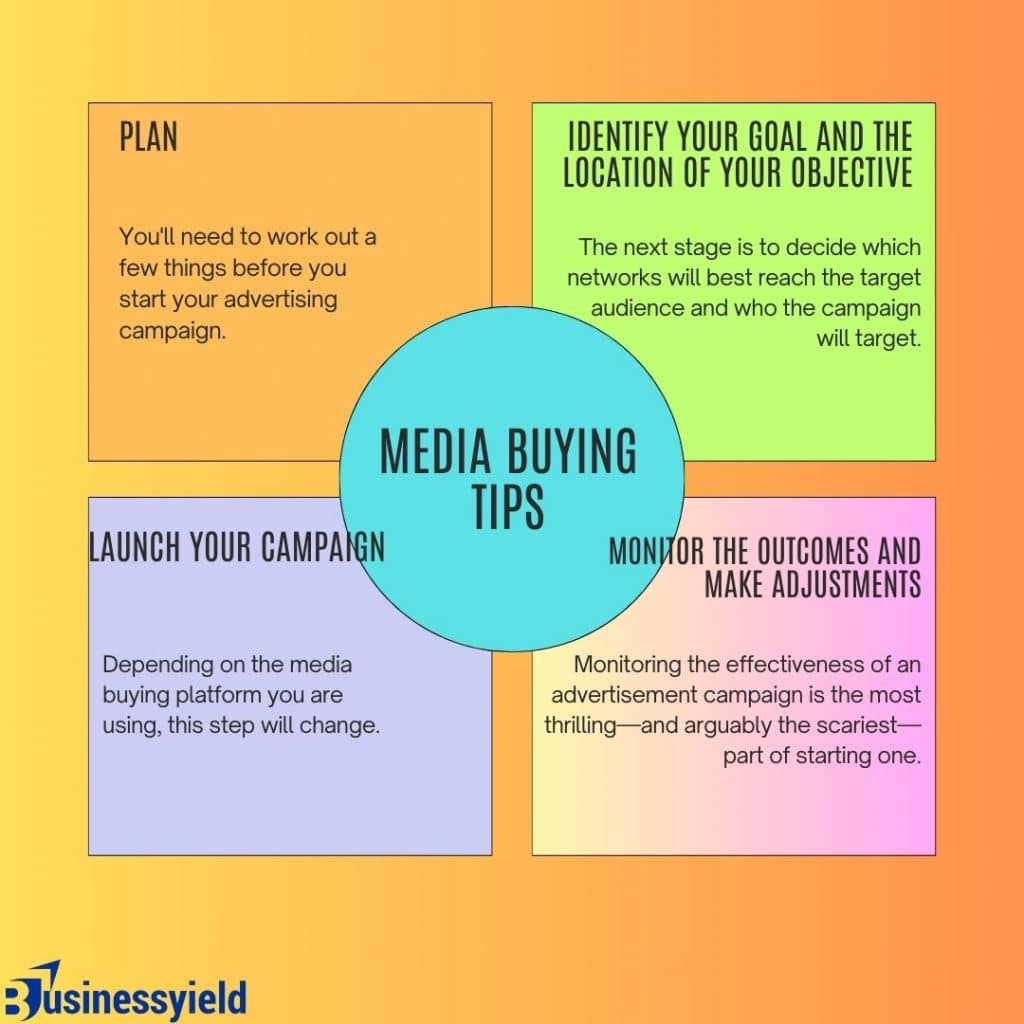
Here are some tips for effective media buying:
#1. Plan
You’ll need to work out a few things before you start your advertising campaign.
First of all, what is the aim of your campaign? Do you want to increase social media engagement, brand exposure, or website traffic? Having a single objective for your team will help you concentrate your efforts and monitor the effectiveness of your campaign.
Hence, we arrive at key progress indicators (KPIs). You must monitor your campaign and decide whether any changes are necessary. Last, you’ll need a budget for your campaign. If the campaign is ongoing, you can allocate a daily amount.
Usually, these actions are finished during the media planning stage. But occasionally, media planners are also in charge of purchasing advertisements.
#2. Identify Your Goal and the Location of Your Objective
The next stage is to decide which networks will best reach the target audience and who the campaign will target.
For example, a health-conscious vegan dessert firm wants to target health-conscious vegan consumers with an upcoming marketing campaign. The marketing department might wish to place advertisements on websites that feature recipes and cooking, fitness and nutrition information, or even YouTube videos that cater to vegans.
While purchasing media, you can target an audience by online browser, device, location, behaviors, and interests, among other factors.
#3. Launch Your Campaign
Depending on the media buying platform you are using, this step will change.
Nevertheless, you will normally input your campaign’s information when utilizing a DSP, including the campaign type, creative assets, budget, target audiences, and bidding techniques. After that procedure, all that needs to be done is launch and watch for the outcomes.
If you’re going the direct route, your team and the account manager at your publisher will work together on this.
#4. Monitor the Outcomes and Make Adjustments
Monitoring the effectiveness of an advertisement campaign is the most thrilling—and arguably the scariest—part of starting one.
You can begin collecting information on the effectiveness of your ads as soon as it launches. It’s crucial at this point to avoid making snap decisions. Before changing, you should collect enough information for a complete picture.
Let’s say the same vegan dessert company advertised on Google’s ad network. They had one video commercial and two static image adverts. After a week, they discovered that the video advertisement outperformed the banner advertisements. Because that ad kind and placement produce superior results, the media buyer may reallocate funds to that campaign.
A media buyer’s job is to maximize ad potential while staying under budget. Therefore, if the advertisement isn’t meeting expectations, changes can and should be made throughout the campaign.
How Long Does It Take to Become a Media Buyer?
Becoming a Media Buyer can typically span 2-4 years. You’ll start with a bachelor’s degree in marketing, advertising, or a related field. Initial roles may include media coordinator or assistant positions, where you’ll learn the ropes of media planning and buying.
Gaining hands-on experience through internships or entry-level roles is crucial. You can progress to a Media Buyer position as you develop analytical skills, an understanding of media channels, and negotiation tactics. The timeline can vary based on individual aptitude, professional networking, and opportunities within your chosen industry. Continuous learning and staying abreast of digital trends can also expedite your path to becoming a proficient Media Buyer.
How to Become a Media Buyer
Becoming a media buyer can be an attractive job for many reasons. Here, I’ve provided a comprehensive checklist summarizing the steps to become a media buyer:
How to Become a Media Buyer Businessyield Checklist
Best Digital Media Buying Platforms
Although the role of “Media Buyer” originated in the Mad Men days, when advertising professionals would purchase ad space in newspapers, tv, and radio, the modern media buying climate is heavily weighted toward companies buying ad space on the primary social channels.
#1. Google Display & Video 360

Display & Video 360 is a feature of the Google Marketing Platform. DV360, formerly DoubleClick Bid Management, works well with Google Analytics and other Google products. Therefore, if your team already uses those tools, this can be your best media buying platform.
To create your campaign, manage your audience and creative assets, examine your statistics, and gain access to leading publishers’ ad inventory, DV360 has five parts. To make it simpler to reach the correct audience, it also provides automatic bidding and personalized targeting utilizing first- and third-party data.
Finally, the platform gives advertisers access to TV viewers and users on websites and YouTube.
#2. TikTok Ads Manager

One of the hottest new ad platforms for 2023 is TikTok; with a large amount of ad inventory, many brands have been shifting some of their advertising budgets to TikTok.
If you are wondering How to run a TikTok ad Campaign? You can start running them from the TikTok Ads Manager, where you can deploy branded ads or “Spark Ads, ” allowing you to run your ad placement on an organic creator account.
#3. Wallester

Wallester Business’s intuitive platform and apps make managing campaign expenses easier. The service allows you to create virtual and physical cards using several accounts with customized daily and monthly restrictions. You can also allocate coworkers to particular cards or campaigns, create cost reports in CSV, Excel, or PDF formats, and add colleagues to your account.
Wallester Business can prevent unsuccessful transactions on well-known platforms like Meta, TikTok, Google, Twitter, Mailchimp, and others. New users can test it out for free by producing the first 300 virtual cards on the site.
#4. Criteo

This platform is an excellent DSP for brands looking to reach online consumers because it has access to a wide network of high-end shops. Consider Macy’s, Kohls, CVS Pharmacy, and Best Buy.
Instead of using third-party cookies, they rely on first-party data to improve ads and choose the best moment and location to interact with customers.
The adaptable attribution models offered by Criteo also facilitate team data analysis.
#5. Snapchat for Businesses

Due to the average demographic on Snapchat, they market their ad product as a great way to connect with young customers. With a highly active user base, Snapchat ads can be a great way to build awareness for your brand. However, it is not known to drive conversions and other platforms.
How do you run Snapchat ads for your brand? They have a programmatic platform similar to Facebook and TikTok.
Is Media Buying a Good Career?
A career in media buying has the potential to advance quickly depending on performance, experience, and transferrable skills. Media buyers negotiate ad placements, evaluate performance statistics, and keep up with industry changes and technology advancements to ensure that advertising campaigns successfully and efficiently reach their intended customers.
Can I Become a Media Buyer With No Experience?
Becoming a Media Buyer without experience is challenging, but it is possible with the right mindset. Begin by learning fundamental marketing principles and advertising platforms.
Consider taking courses or earning certifications in digital marketing and analytics and seeking internships or entry-level positions in advertising or marketing departments. Networking and finding a mentor in the media purchasing industry can also provide vital insights.
Showcase your analytical skills, flexibility, and desire to learn. These efforts can help you gain the experience you need to advance to the position of Media Buyer.
Bottom Line
In conclusion, media buying is highly complex, emphasizing finding the best ad placement for customer satisfaction and conversions. By staying abreast of top media buying strategies and negotiation tactics, media buyers can better optimize spend and strategy.
Similar Articles
- HOW MUCH DO RECRUITERS MAKE: 2023 Salaries
- Private Placement: Definitions, Life Insurance And Investment Offers (+ How it works)
- CAMPAIGN MANAGEMENT TOOLS: Free Tools and Application

